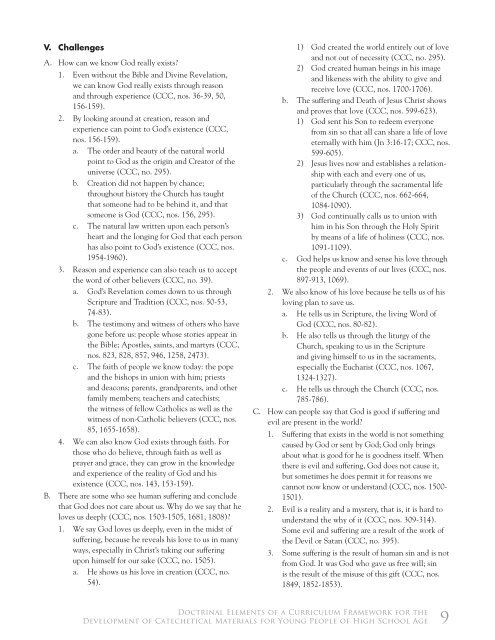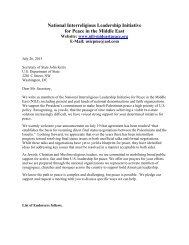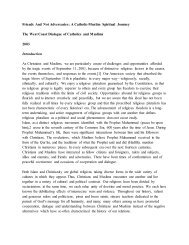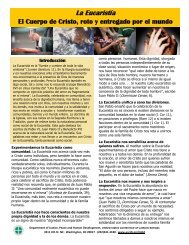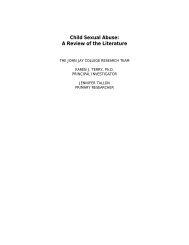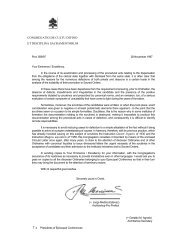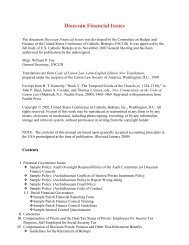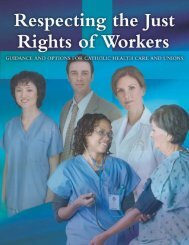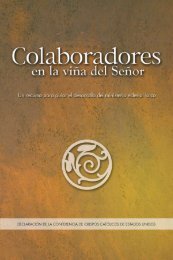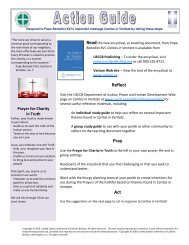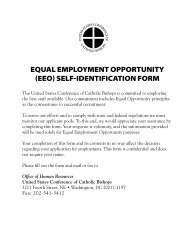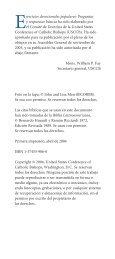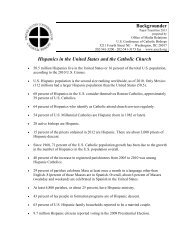Doctrinal Elements of a Curriculum Framework for the Development ...
Doctrinal Elements of a Curriculum Framework for the Development ...
Doctrinal Elements of a Curriculum Framework for the Development ...
- No tags were found...
Create successful ePaper yourself
Turn your PDF publications into a flip-book with our unique Google optimized e-Paper software.
V. ChallengesA. How can we know God really exists?1. Even without <strong>the</strong> Bible and Divine Revelation,we can know God really exists through reasonand through experience (CCC, nos. 36-39, 50,156-159).2. By looking around at creation, reason andexperience can point to God’s existence (CCC,nos. 156-159).a. The order and beauty <strong>of</strong> <strong>the</strong> natural worldpoint to God as <strong>the</strong> origin and Creator <strong>of</strong> <strong>the</strong>universe (CCC, no. 295).b. Creation did not happen by chance;throughout history <strong>the</strong> Church has taughtthat someone had to be behind it, and thatsomeone is God (CCC, nos. 156, 295).c. The natural law written upon each person’sheart and <strong>the</strong> longing <strong>for</strong> God that each personhas also point to God’s existence (CCC, nos.1954-1960).3. Reason and experience can also teach us to accept<strong>the</strong> word <strong>of</strong> o<strong>the</strong>r believers (CCC, no. 39).a. God’s Revelation comes down to us throughScripture and Tradition (CCC, nos. 50-53,74-83).b. The testimony and witness <strong>of</strong> o<strong>the</strong>rs who havegone be<strong>for</strong>e us: people whose stories appear in<strong>the</strong> Bible; Apostles, saints, and martyrs (CCC,nos. 823, 828, 857, 946, 1258, 2473).c. The faith <strong>of</strong> people we know today: <strong>the</strong> popeand <strong>the</strong> bishops in union with him; priestsand deacons; parents, grandparents, and o<strong>the</strong>rfamily members; teachers and catechists;<strong>the</strong> witness <strong>of</strong> fellow Catholics as well as <strong>the</strong>witness <strong>of</strong> non-Catholic believers (CCC, nos.85, 1655-1658).4. We can also know God exists through faith. Forthose who do believe, through faith as well asprayer and grace, <strong>the</strong>y can grow in <strong>the</strong> knowledgeand experience <strong>of</strong> <strong>the</strong> reality <strong>of</strong> God and hisexistence (CCC, nos. 143, 153-159).B. There are some who see human suffering and concludethat God does not care about us. Why do we say that heloves us deeply (CCC, nos. 1503-1505, 1681, 1808)?1. We say God loves us deeply, even in <strong>the</strong> midst <strong>of</strong>suffering, because he reveals his love to us in manyways, especially in Christ’s taking our sufferingupon himself <strong>for</strong> our sake (CCC, no. 1505).a. He shows us his love in creation (CCC, no.54).1) God created <strong>the</strong> world entirely out <strong>of</strong> loveand not out <strong>of</strong> necessity (CCC, no. 295).2) God created human beings in his imageand likeness with <strong>the</strong> ability to give andreceive love (CCC, nos. 1700-1706).b. The suffering and Death <strong>of</strong> Jesus Christ showsand proves that love (CCC, nos. 599-623).1) God sent his Son to redeem everyonefrom sin so that all can share a life <strong>of</strong> loveeternally with him (Jn 3:16-17; CCC, nos.599-605).2) Jesus lives now and establishes a relationshipwith each and every one <strong>of</strong> us,particularly through <strong>the</strong> sacramental life<strong>of</strong> <strong>the</strong> Church (CCC, nos. 662-664,1084-1090).3) God continually calls us to union withhim in his Son through <strong>the</strong> Holy Spiritby means <strong>of</strong> a life <strong>of</strong> holiness (CCC, nos.1091-1109).c. God helps us know and sense his love through<strong>the</strong> people and events <strong>of</strong> our lives (CCC, nos.897-913, 1069).2. We also know <strong>of</strong> his love because he tells us <strong>of</strong> hisloving plan to save us.a. He tells us in Scripture, <strong>the</strong> living Word <strong>of</strong>God (CCC, nos. 80-82).b. He also tells us through <strong>the</strong> liturgy <strong>of</strong> <strong>the</strong>Church, speaking to us in <strong>the</strong> Scriptureand giving himself to us in <strong>the</strong> sacraments,especially <strong>the</strong> Eucharist (CCC, nos. 1067,1324-1327).c. He tells us through <strong>the</strong> Church (CCC, nos.785-786).C. How can people say that God is good if suffering andevil are present in <strong>the</strong> world?1. Suffering that exists in <strong>the</strong> world is not somethingcaused by God or sent by God; God only bringsabout what is good <strong>for</strong> he is goodness itself. When<strong>the</strong>re is evil and suffering, God does not cause it,but sometimes he does permit it <strong>for</strong> reasons wecannot now know or understand (CCC, nos. 1500-1501).2. Evil is a reality and a mystery, that is, it is hard tounderstand <strong>the</strong> why <strong>of</strong> it (CCC, nos. 309-314).Some evil and suffering are a result <strong>of</strong> <strong>the</strong> work <strong>of</strong><strong>the</strong> Devil or Satan (CCC, no. 395).3. Some suffering is <strong>the</strong> result <strong>of</strong> human sin and is notfrom God. It was God who gave us free will; sinis <strong>the</strong> result <strong>of</strong> <strong>the</strong> misuse <strong>of</strong> this gift (CCC, nos.1849, 1852-1853).<strong>Doctrinal</strong> <strong>Elements</strong> <strong>of</strong> a <strong>Curriculum</strong> <strong>Framework</strong> <strong>for</strong> <strong>the</strong><strong>Development</strong> <strong>of</strong> Catechetical Materials <strong>for</strong> Young People <strong>of</strong> High School Age9


